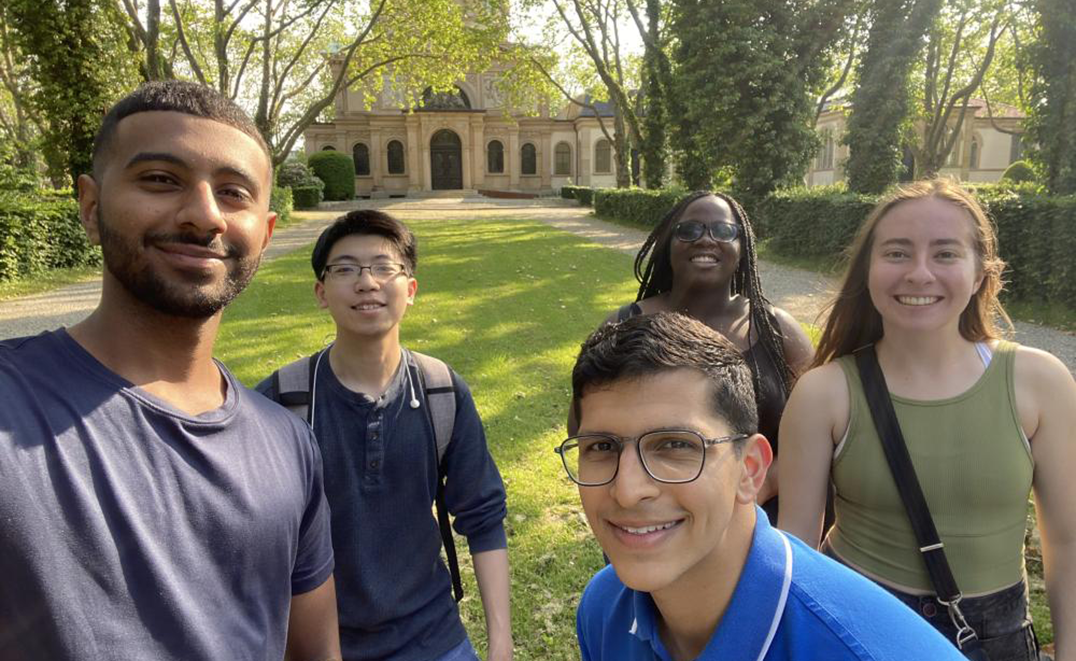News & Press
Penn State undergraduate students thrive in iPRISM research internship program
First cohort of the new exchange program comes to Germany for eight weeks
This summer, four undergraduate students from four different departments and two colleges at Penn State investigated new engineered living materials — materials that exhibit life-like features — for eight weeks in Germany. These students are the first cohort of the new International Partnership for Responsive Infrastructure using Sustainable Multifunctional Materials (iPRISM), a program funded by the National Science Foundation and led by the Penn State Center for Living Multifunctional Materials Systems (LiMC2).
The program builds on the partnership between LiMC2 and the University of Freiburg livMatS Cluster of Excellence in Germany and includes four weeks of remote on-boarding sessions, eight weeks of in-person research in Germany, as well as a final week of presentations, reflections and debriefing at Penn State. As part of iPRISM, the students are guided in their research by world-renowned experts and have access to unique facilities, including full-scale built structures that incorporate novel and nature-inspired composites.
This year's cohort conducted research on various aspects of engineered living materials, from assessing triboelectricity, where electric power is generated through contact between different materials, to designing lightweight structures inspired by nature to printing architectural structures with carbon dioxide. The students specifically focused on developing projects with the aim of solving sustainable development challenges from an interdisciplinary perspective.

The first cohort of the new program: Sami Al Azri, Yuanlin Cen, David Caballero Russi, Firmelia Yamonche, Sarah Chekan Credit: David Caballero Russi. (left to right)
A new cohort will participate in the iPRISM program in summer 2024 and summer 2025. Over the total three years of the program, the student research projects will focus on advancing adaptive architecture concepts, with the goal of furthering the resilience and sustainability of buildings while also broadening the educational mission around academic convergence and global engagement.
The inaugural cohort:
- Sarah Chekan, a fourth-year student majoring in mechanical engineering who delved into the mechanics behind triboelectricity
- Sami Al Azri, a fourth-year student majoring in energy engineering, investigating hygromorphic actuators for adaptive facades
- Firmelia Yamonche, a third-year student majoring in aerospace engineering, focusing on living load adaptive green composites
- Yuanlin Cen, a fourth-year student majoring in engineering science, working on a pioneering 3D stone printer that utilizes carbon dioxide gas exposure as its core technology
In addition, David Caballero Russi, a doctoral student in civil engineering, who has active research collaborations at the University of Freiburg as part of a recent LiMC2 seed grant, served as a mentor to the students, lending his expertise in research communication, elevator pitches and effective time management. Cabellero Russi’s role was designed to elevate the professional development and skills of the student researchers.
All four students who participated this year unanimously expressed the success of the research internship program. From Al Azri's exposure to diverse cultural backgrounds to Cen's enhanced research and communication skills and Chekan's clarity on her future career goals, the students said the experience was transformative and inspiring.
While the students experienced the challenges of researching in an international context, notably language hurdles and concerns about being in a different country and an unfamiliar culture, the students said these apprehensions were quickly put to rest. "There were so many people from so many places around the world, I never felt weird or different," Yamonche said. Al Azri, too, said he enjoyed the European lifestyle and often opted to bike in the old city of Freiburg — known for its cyclist-friendly streets. “It’s an experience that can’t be taken away from you,” Chekan said, noting it was a truly transformative experience for young researchers to reach new heights while contributing to the burgeoning science of engineered living materials.
iPRISM, which covers all costs associated with travel, lodging and meals for student participants, is set to recruit five to six students for summer 2024. The program leads are particularly committed to recruiting and mentoring students from underrepresented groups.
Get an insight into the program with this video:
